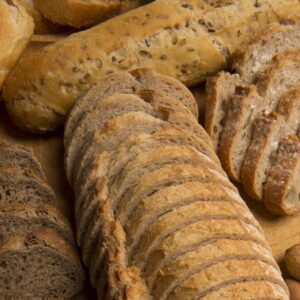
Exhausted all the time? Need more energy and vitality? Dietitian Brooke Longfield shows how to fuel your body for peak performance, every day.
Do you have a fit friend or a favourite sports star whose strength and stamina you admire? Do you find yourself wishing you had their energy? If you’re tired all the time and lacking in vitality, you’ve come to the right place. Here’s how to fuel your body to perform at your best, just like an athlete does, every day.
1. Eat a breakfast of champions
An elite athlete wouldn’t think of starting the day on an empty tank. A nourishing breakfast can improve both mental and physical performance for the entire day. So if you often have the brain fuzzies by 10am, try taking just a few minutes to make a healthy breakfast before heading out in the morning.
Tips
- Start with protein: Swap jam or Marmite on toast for more satisfying choices such as half a cup of low-fat Greek-style yoghurt on untoasted muesli, or a poached egg on wholegrain toast.
- No time to sit down? Blitz a banana, kiwifruit, oats and plain yoghurt with milk for a fibre-packed smoothie on the go.
- Ditch the quick fixes: It’s easy to grab a muffin with your takeaway coffee, but the refined carbs will leave you hungry again very quickly.
2. Charge up with long-lasting carbs
Remember those ads where rugby players sit down to a bowl of 12 Weet-Bix? No, you don’t need to do that, but carbs are important – they are our primary source of fuel. For long-lasting energy, eat carbs that are broken down slowly. These low-GI carbs include high-fibre foods such as wholegrain bread, oats, brown rice, lentils and beans, and wholemeal pasta. Include these at every meal.
Tips
- Measure it out: Use a measuring cup to get it right. A healthy portion of cooked rice or small pasta (such as risoni) for a moderately active female is around half a cup.
- On the pulse: Add more beans and legumes, such as chickpeas and lentils, to your meals. They’re rich in satisfying protein and fibre, so you’ll be full of beans.
- Go for grains: Choosing the best bread and crackers for long-lasting energy can be tricky, but let your eyes guide you – look for dark, visible grains.
3. Pump up the iron
More than 10 per cent of women up to 50 years old show signs of iron deficiency, which can leave you feeling tired and lethargic. It can also mean you’re more likely to get sick. So if you’re feeling run down, it might be worth seeing your doctor to check your iron levels.
Younger women are at higher risk of iron deficiency due to blood loss during menstruation. They also have higher iron needs during pregnancy and breastfeeding. Athletes are at risk of iron deficiency, as they lose iron through sweat.
Bolster your iron stores by eating iron-rich foods such as lean meat, poultry and fish. Eggs, tofu, legumes and spinach are good vegetarian sources of iron.
Tips
- Maximise iron absorption: Eating foods high in iron with vitamin C-rich foods – for example, lentils with vitamin C-rich kumara – helps the body to absorb iron.
- Cut the fat: Choose lean cuts of red meat, and trim all visible fat to reduce your saturated fat intake.
- Time your caffeine: Tea and coffee decrease the iron your body absorbs, so try not to drink them at mealtimes.
4. Smart snack
When you need to snack, give the choccy biscuits a swerve and reach for foods that add nutrition to your day and stave off the hunger pangs for longer.
Chocolate at your desk is not the answer to a 3pm energy slump; a quick walk, preferably outside, but even around the office, will be more energising.
Rather than relying on vending machines at work, bring healthy snacks with you.
Eat within 30 minutes after exercising to help your body recover. Choose a combination of protein and carbs, such as a fruit and yoghurt smoothie, peanut butter on toast, or a couple of crackers with cheese.
Tips
- Emergency drawer: If you work in an office, it’s easy to stash healthy snacks such as nuts and high-fibre nut or muesli bars in your desk drawer.
- Learn portions: Divide your food into individual portions so you don’t overeat at snack time. Pop 30g (about two tablespoons) of nuts into zip-lock bags, and divide large tubs of yoghurt by spooning them into small half-cup containers.
- Munch and chew: Crunchy vege sticks and fresh fruit, such as apples, are satisfying choices and require some chewing time. Research shows that chewing more can help you eat less.
5. Every drop counts
Staying hydrated during exercise is important for an athlete’s performance and health. New research has found even very low levels of dehydration can affect mental performance.
Dehydration is a key cause of exhaustion because when we’re dehydrated, our blood thickens and it can’t supply optimum energy to our brain and body, so we feel sluggish and tired. It’s important, therefore, that we drink enough water, about 8–10 cups, throughout the day in order to stay properly hydrated. We need more when it’s hot or when exercising.
While serious sportspeople use sports drinks to rehydrate themselves, these really aren’t necessary for the average Joe. Unless you’re exercising intensely for 90 minutes or more, plain water is sufficient to rehydrate, and even then it may be all you need. Water doesn’t have the kilojoules of sugary sports drinks.
Tips
- Bottoms up: Keep a water bottle with you at all times. Go for a large one (750–1000ml) and set a goal to top it up two to three times a day. (For the good of your teeth, don’t swish it around, diluting saliva. Just swallow it.)
- Thirst vs hunger: It’s common to confuse hunger with thirst. So before you reach for a snack, drink a large glass of water and wait 10 minutes to see if you’re truly hungry.
- Sweet twist: Don’t like drinking plain water? Add flavour with a twist of lemon or a sprig of mint, or sip on a refreshing herbal tea.
6. Eat, sleep… repeat
One of the secrets to success is a good night’s sleep. Sleep is hugely important for our recovery, both physically and mentally.
Studies show having poor sleep affects the way we make split-second decisions and our concentration, as well as mood.
We also know that a lack of sleep can strongly impact on the way we eat the following day, steering us towards high-fat, high-sugar choices which can lead to weight gain. So to stay on top of your game, aim to get seven to eight hours of sleep every night.
Tips
- Cut the coffee: Caffeine stays in our system for up to 10 hours, and has a half-life of more than five hours, so avoid afternoon or evening coffees that can leave you feeling buzzed late at night.
- Power down: Avoid using electronic devices such as laptops, TVs and mobile phones an hour before going to bed as it can make falling asleep harder. Instead, dim the lights and read a book.
- Be consistent: Try to go to bed and wake up at the same time each day. Research shows that this helps to avoid daytime sleepiness.
Make a move
Get moving for at least 30 minutes a day. Even when you’re tired and exercise is the last thing on your mind, it can actually make you feel more energised. Getting active gets your blood pumping, releases feel-good endorphins and lowers the stress hormone, cortisol. It can also improve your sleep.
Stress vs burnout: What’s sucking all my energy?
Being stressed affects your whole body. Stress hormones, such as adrenaline and cortisol, speed up your heart rate, breathing and metabolism.
Nature intended this to be a short-term reaction. But if you feel stressed over a long period of time, the extra pressure on your body can lead you to feel physically and mentally exhausted. This is called burnout, where you lose the drive and motivation for many of the things you previously enjoyed. Eating well can be your first step to getting back your vitality and energy.
High-octane foods
Keep these energising foods on high rotation. Eat a variety of them each day.
- nuts
- eggs
- leafy greens
- salmon/tuna
- peanut butter
- wholegrain bread
- bananas
- plain yoghurt
- kumara
Your 24-hour guide to eating for energy
6.30am Time to move
Drink a big glass of water to rehydrate. Then get a head start on the day with 30–45 minutes of exercise, such as a brisk walk or a yoga class.
7.30am Balanced brekkie
A combination of protein, carbs and healthy fats gives you the energy to power through your morning and also keeps you full for longer.
9.30am Pit stop
Skip the muffin or cake with your morning coffee, and instead pour a big glass of water to go with it.
10.45am Munchies
Snack on a piece of fruit and/or small handful of nuts, which are rich in energising B vitamins and fibre to keep you satisfied until lunch.
12.30pm Light lunch
Avoid a heavy lunch as it will zap your energy while your body works hard to digest it. Instead, include slow-burning carbs such as wholegrain bread or canned beans.
2.00pm Refill
Don’t confuse your hunger for thirst – time for another big glass of water.
3.30pm Snack happy
Beat afternoon sleepiness with a snack that will satisfy until dinner time.
7.00pm Protein-rich dinner
Aim to eat two hours before bed so your body has time to digest the meal. Eat a palm-sized piece of lean protein with wholegrain carbs and at least half a plate of colourful veges.
9.00pm Tea time
A steaming cup of herbal tea is a good way to wind down before heading to bed.
10.30pm Lights out
Shut off electronic devices such as mobile phones, laptops or the TV. Recharge yourself with 7–8 hours of sleep.
Article sources and references
- Australian Breakfast Cereal Manufacturers Forum. 2016. A Healthy Habit. www.cereal4brekkie.org.au/a-healthy-habit/ Accessed May 2016http://www.cereal4brekkie.org.au/a-healthy-habit/
- Australian Institute of Sport. Fluid – who needs it? www.ausport.gov.au Accessed September 2016https://www.sportaus.gov.au/
- Australian Psychological Society. 2014. Stress and wellbeing in Australia survey 2015. www.psychology.org.au Accessed May 2016https://www.psychology.org.au/
- Benton D et al. 2016. Minor degree of hyphohydration adversely influences cognition. American Journal of Clinical Nutrition 1014:603-12https://www.ncbi.nlm.nih.gov/pubmed/27510536
- Harvard Health Publications. 2011. Exercising to relax. www.health.harvard.edu/staying-healthy/exercising-to-relax Accessed May 2016https://www.health.harvard.edu/staying-healthy/exercising-to-relax
www.healthyfood.com










